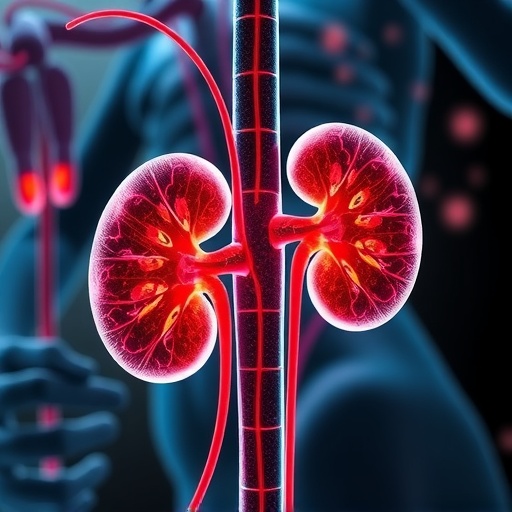In recent breakthroughs within nephrology, two promising therapies have emerged, heralding a new era in the treatment of chronic kidney diseases linked to diabetes and immune-mediated glomerulonephritis. At the forefront is finerenone, a novel nonsteroidal mineralocorticoid receptor antagonist, which has demonstrated significant efficacy in reducing key kidney and cardiovascular risks in patients suffering from chronic kidney disease (CKD) alongside diabetes. Historically, therapeutic advancements in type 1 diabetes-related CKD have lagged behind, creating an urgent need for effective treatment modalities. The phase 3 FINE-ONE trial represents a pivotal moment, targeting this unmet need by evaluating finerenone’s impact specifically in type 1 diabetes populations.
The FINE-ONE study distinguished itself by focusing on the critical surrogate marker of albuminuria reduction over a six-month course of treatment, which serves as a translational biomarker linking observed short-term clinical effects with anticipated long-term renal benefits. Albuminuria, the presence of albumin in urine, is not only a hallmark of kidney damage but also an indicator predicting progression towards end-stage kidney disease. Results from the trial demonstrated that finerenone achieved a notable 25% reduction in albuminuria relative to placebo, reaffirming the drug’s potential to mitigate kidney damage. Additionally, the safety profile was favorable; the therapy was well tolerated with only modest elevations in serum potassium levels, an important consideration given the risk of hyperkalemia with mineralocorticoid receptor antagonists.
Finerenone’s mechanism of action highlights its therapeutic promise. Unlike steroidal mineralocorticoid receptor antagonists such as spironolactone, finerenone selectively targets mineralocorticoid receptors with high affinity and minimal off-target effects. This selectivity facilitates potent anti-fibrotic and anti-inflammatory effects within renal tissues, which are pivotal pathogenic processes driving CKD progression in diabetes. Consequently, finerenone not only curbs biochemical markers of kidney injury but may also exert structural preservation of renal architecture, improving long-term clinical outcomes.
Historically, interventions for type 1 diabetes associated CKD have centered on renin-angiotensin-aldosterone system (RAAS) inhibitors, such as ACE inhibitors and ARBs. However, these therapies, while effective, have limitations and do not fully halt disease progression. The emergence of finerenone marks the first meaningful therapeutic advance since RAAS inhibitors, offering a novel pharmacodynamic approach to kidney disease modification. Its introduction could redefine standards of care and extend longevity and quality of life for patients confronting this debilitating condition.
Parallel to advances in diabetic kidney disease, immunologically mediated nephropathies have seen exciting progress, illustrated by developments with atacicept in IgA nephropathy (IgAN). IgAN, characterized by immune complex deposition in the glomeruli, involves dysregulation of B cell function and overproduction of antibodies that fuel glomerular inflammation and damage. Atacicept, a recombinant fusion protein, exerts its effect by binding and neutralizing crucial immunoregulatory cytokines BAFF (B-cell Activating Factor) and APRIL (A Proliferation-Inducing Ligand). These cytokines are instrumental in B cell survival and maturation, making them strategic targets in immune complex-mediated renal diseases.
The ongoing phase 3 ORIGIN 3 trial evaluates atacicept’s efficacy and safety in a large cohort of IgAN patients. Preliminary data indicates substantial improvement in clinical parameters, including overall reduction in pathogenic antibodies implicated in IgAN pathogenesis, decreased hematuria that signals less active glomerular injury, and lowered proteinuria, a classical marker of ongoing kidney damage. These findings are in line with earlier phase trials and exemplify promising therapeutic modulation of the immune system to preserve renal function and delay progression to kidney failure.
Atacicept’s approach highlighting B cell modulation contrasts with conventional immunosuppressive therapies, which often carry broader immunosuppressive effects and associated risks. Targeted inhibition of BAFF and APRIL allows for a more refined immunomodulation, potentially minimizing adverse effects while curtailing disease activity. As IgAN remains the most common type of primary glomerulonephritis worldwide, with limited approved treatments, such advances offer hope for more effective disease control and improved patient prognoses.
Both finerenone and atacicept represent strides in precision medicine in nephrology, capitalizing on enhanced understanding of disease-specific pathogenic pathways. They exemplify the trend towards therapies that not only improve surrogate markers but also hold promise for translating into meaningful clinical outcomes like reduced end-stage renal disease incidence, fewer cardiovascular events, and extended survival for chronic kidney disease patients.
Moreover, these studies underscore the importance of large-scale, rigorously designed clinical trials in validating novel therapeutic agents. The data emerging from the FINE-ONE and ORIGIN 3 trials will inform future guidelines and clinical practice, shaping the management landscape of complex kidney diseases. Their findings contribute to a growing arsenal of kidney-protective agents which may be used alone or in combination to maximize therapeutic efficacy while maintaining safety.
As researchers continue to unravel the molecular underpinnings of kidney diseases, the pipeline for nephrology therapeutics looks increasingly robust. Investigational drugs such as finerenone and atacicept not only highlight the intersection of immunology and nephrology but also present opportunities to mitigate the clinical and economic burdens imposed by chronic kidney illnesses globally.
In the coming years, integrating these novel agents into clinical practice will necessitate ongoing surveillance to monitor long-term safety and durability of their benefits. Real-world studies and post-marketing data will be crucial to refine patient selection criteria, dosing strategies, and combination regimens that optimize outcomes. The nephrology community anticipates that these therapies will be cornerstone options in personalized treatment plans tailored to specific disease phenotypes and pathophysiological mechanisms.
Ultimately, the promise shown by finerenone in type 1 diabetes-associated CKD and atacicept in IgAN highlights a transformative phase in kidney disease management. With these innovations, the field moves closer to its goal of not only slowing kidney disease progression but also preventing the devastating sequelae of kidney failure, including dialysis dependency and cardiovascular morbidity.
Subject of Research: Novel therapeutic agents for chronic kidney disease in diabetes and immune-mediated glomerulonephritis
Article Title: Finerenone and Atacicept: Groundbreaking Therapies Redefining Chronic Kidney Disease Treatment Paradigms
News Publication Date: Not specified
Web References:
- American Society of Nephrology: www.asn-online.org
Keywords: chronic kidney disease, finerenone, mineralocorticoid receptor antagonist, type 1 diabetes, IgA nephropathy, atacicept, B-cell Activating Factor, APRIL, albuminuria, proteinuria, nephrology, immunomodulation




